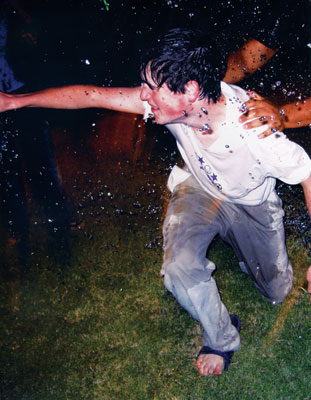All Nonfiction
- Bullying
- Books
- Academic
- Author Interviews
- Celebrity interviews
- College Articles
- College Essays
- Educator of the Year
- Heroes
- Interviews
- Memoir
- Personal Experience
- Sports
- Travel & Culture
All Opinions
- Bullying
- Current Events / Politics
- Discrimination
- Drugs / Alcohol / Smoking
- Entertainment / Celebrities
- Environment
- Love / Relationships
- Movies / Music / TV
- Pop Culture / Trends
- School / College
- Social Issues / Civics
- Spirituality / Religion
- Sports / Hobbies
All Hot Topics
- Bullying
- Community Service
- Environment
- Health
- Letters to the Editor
- Pride & Prejudice
- What Matters
- Back
Summer Guide
- Program Links
- Program Reviews
- Back
College Guide
- College Links
- College Reviews
- College Essays
- College Articles
- Back
Bullying : You Are the Antagonist!
If you love a child and you’re worried that something about them is going to make them a target for bullying or other cruelty in the future, the best possible thing you can do is give them as much validation and support as you possibly can, and do your best to counteract the cultural messaging they’re going to receive about the ‘wrongness’ of being different. Show that child unwavering respect as a human being, and demand that others in that child’s life also treat them with respect.
The worst possible thing you can do for a child who is fat, gender nonconforming, disabled, LGBT+, or otherwise different from most of the other children they will grow up knowing, is to tell them they have to hide or get rid of their differences so people won’t be mean to them.
You need to refuse to become a child’s first bully. The world can be an awful, cruel place to kids who aren’t like their peers – but you can counteract some of that cruelty instead of being the first to show it. Accept kids for who they are and teach them that they deserve respect and care as they are, that they don’t have to earn love or kindness by suppressing parts of themselves to fit someone else’s idea of who they should be.
Even if you actually succeed in forcing a child to be ‘more normal’, the lessons they take away from seeing themselves as unworthy without changing major aspects of their appearance, personality, etc., will stay with them forever. It’s traumatic to be told who you are as a person is a bad thing.
Whether you succeed or not, the attempt will teach them that it’s acceptable for others to demand they change major aspects of who they are; that bullying is an acceptable way to show love; that they deserve any cruelty people show them for being different; and that if others around them are ‘weird’, they’re entitled to bully those others into compliance just as they themselves were bullied – by you.
Children with eating disorders are in a worse position than happy fat kids with adults in their life who love and support them exactly as they are. Children who are bullied until they stop self-expressing in ways that defy gender roles are in a worse position than happy gender nonconforming kids who have adults in their life who stand up for them and love and support them exactly as they are.
Autistic kids who grow up in an environment where their differences aren’t treated as burdens are better off than autistic kids who are traumatized by abusive therapies where they’re trained to deny any uniquely autistic needs, pain, or body language and taught implicitly that who they are is lesser.
Don’t try to change a child to make the world safer for them. By teaching them that who they are is the problem, rather than the bullying itself, you are being part of that danger. Instead, do everything you can to honour and respect the children you love for who they are.
Encourage them to think well of themselves and to not believe any messaging they’re receiving from the world that tells them they’ll never be good enough until they conform. Seek out and create positive representation of people like them – and people who are different in a multitude of other ways – who are good, interesting, worthwhile people. Compliment them on the unique ways they express themselves. Teach them not to be afraid of not being exactly like everyone else.
A kid can grow up different and still be okay. But they need the support and love of the people around them to make it in a sometimes hostile world. And they need the adults in their life to work to keep that hostile world at bay as much as possible, and not be part of the hostility.

Similar Articles
JOIN THE DISCUSSION
This article has 0 comments.